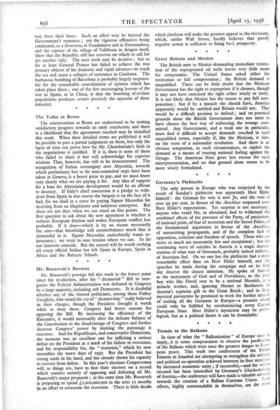The conversations at Rome are understood to be making satisfactory
progress towards an early conclusion, and there is a likelihood that the agreements reached may be initialled this week. When their detailed terms are published it will be possible to pass a partial judgement on them, but only the lapse of time can prove how far Mr. Chamberlain's faith in the negotiations is justified. If it is, there is none of those who failed to share it but will acknowledge his superior wisdom. That, however, has still to be demonstrated. The recognition of Italian sovereignty over Abyssinia, towards which preliminary but so far non-committal steps have been taken at Geneva, is a heavy price to pay, and we must know very clearly what we are paying it for. Any idea of support for a loan for Abyssinian development would be an affront to decency. If Italy's chief concession is a pledge to with- draw from Spain in due course the bargain is on the face of it bad, for we shall in a sense be paying Signor Mussolini for desisting from an illegitimate and nefarious enterprise. But these are not days when we can stand on fine points. The first question to ask about the new agreement is whether it reduces European friction and makes European conflict less probable. If it does—which is by no means necessarily the case—that knowledge will counterbalance much that is distasteful in it. Signor Mussolini undoubtedly wants re- insurance ; we want to ease tension where we can. So far our interests coincide. But the accord will be worth nothing till every official Italian has left Spain in Europe, Spain in Africa and the Balearic Islands.
* * * *






































 Previous page
Previous page